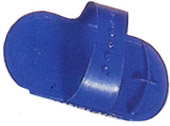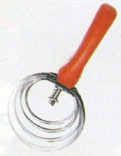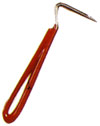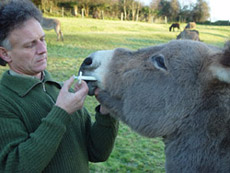|
Care

Body care:
Your donkey will appreciate being brushed regularly at a young age.
It is a way to be closer to your companion, and in taming it, but
also to ensure him a good fur.
In the adult donkey, an iron currycomb of iron will
be more effective to clean its fur, particularly before the rambling
or carting, and in spring when it loses its winter coat.
 Plastic Finnish currycomb (ref. Equip'Horse)
Plastic Finnish currycomb (ref. Equip'Horse) |
 Iron currycomb, (ref. Equip'Horse)
Iron currycomb, (ref. Equip'Horse) |
Maintenance of the hoof:
Regularly, before and after any walk, think of cleaning the
interior of the hoof with a metal hoof-pick. Even if the horn
is very hard, the hoof of the donkey should not to be neglected. |
 hoof-pick
hoof-pick
(ref. Equip'Horse) |
The horn of the donkey has the characteristic to be
very hard, and to grow very quickly. The feet need reassessing by
a farrier frequently. Any negligence can have serious consequences
on the balances.
In my breeding, the farrier visits to reassess the hoof at least
three times per year. It is delicate work, so I do not advice you
to do it yourself but call a professional.
Vermifugation:
It is important not to forget the vermifugation approximately
twice per year, more often for the foal (but follow your veterinary
surgeon's advice) to destroy the internal parasites.
|
For the small breeders, I advice vermifuges
in oral syringe which contain a paste. These syringes are
prepared in five or six hundred kilogrammes, therefore do
not forget to adjust the ring with the weight corresponding
to your donkey.
Lift the head of the donkey, introduce the nozzle
of the syringe between the lips at the side of the jaw, take
care to put the nozzle of the syringe is on the tongue, and
push the piston until it stops by the ring.
|
 |
 When
the stallion is covering the mare, certain vermifuges can make it
temporarily sterile. So, ask advice from your veterinary surgeon. When
the stallion is covering the mare, certain vermifuges can make it
temporarily sterile. So, ask advice from your veterinary surgeon.
INOCULATIONS:
| Equine influenza |
This vaccine is necessary if your donkey participate's in
public demonstrations (fairs, competitions, expositions...).
|
| Tetanus |
Tetanus is still very frequent in France, but
it is not contagious, so it is not obligatory. |
| Rage |
The rage disappeared in France, therefore a vaccination
is not obligatory any more. |
It is better to use a vaccine influenza-tetanus
to be sure.
First inoculation:
- Two doses in 30 days apart, when it is 4 months old and if the
mother has had regular inoculations.
- Recall equine influenza: six months later, then annual recall.
- Recall tetanus: one year later, then every three years.
If you want validation of the inoculations on the
identification card, it must be made by your veterinary surgeon
who label's, dates and signs.
|










